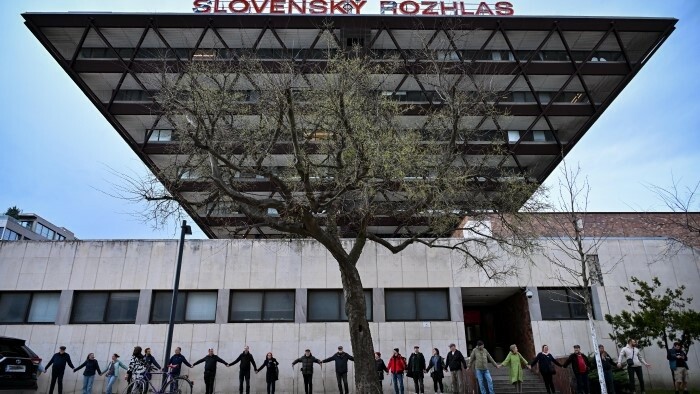The draft law on Slovak Television and Radio will be discussed by the Government at Wednesday's meeting in Dolna Krupa. Prime Minister Robert Fico confirmed this after a working visit to the Ministry of Culture on Monday. Culture Minister Martina Šimkovičová also spoke with Prime Minister Robert Fico about the financing of churches and religious communities, amendments to the law on the culture of national minorities, the preparation of the law on the state language and the law on sponsorship in culture. She also announced a change in the categorisation of cultural monuments.
“As we have beautiful cultural monuments but not all of them can have the status of the national cultural monument and we want to save them all but it is not possible from the financial neither from the staff capacity reasons.”
While the Prime Minister praises the Minister for her support of Slovak national culture, the deputy chair of the Committee on Culture and Media, Zora Jaurová of Progressive Slovakia, criticises them both for destroying everything that has worked well in the culture ministry.
“Robert Fico is making use of this Mečiar narrative in which he is constantly seeking an external enemy who is responsible for the current state of issues. Instead of bringing solutions with the Culture Minister to real problems that the Slovak Culture is facing.”
The most important issue for the ministry at the moment is the change of the public broadcaster RTVS Act. According to Robert Fico, this will happen soon.
“With a probability close to certainty, we will be discussing on Wednesday at the Government session the draft on Television and Radio that is setting new parameters for the functioning of this institution.”
The chairman of the opposition SaS party, Branislav Grohling, sees this as an effort by the Prime Minister to take control of the public broadcaster so that it will be a television station that will make propaganda for the government.
“A television that will not be telling voters that the gas prices are too high, that the government is not solving the food prices, is reducing sentences for criminals and is increasing taxes for people while okaying higher salaries for themselves.”
The most controversial clauses, such as the possibility to dismiss the Director General without giving a reason, have been dropped from the original bill. The ministry also dropped the intention to establish a government-controlled Programme Council, which was supposed to have influence on the broadcasting of the public service broadcaster. The change lies in creating an Ethics Commission, which will now be an advisory body to the Council and will appoint its members. And the members of the Council itself will be nominees of the Ministries of Culture and Finance, the other half will be elected by the National Council.
RTVS, Anna Lačoková


